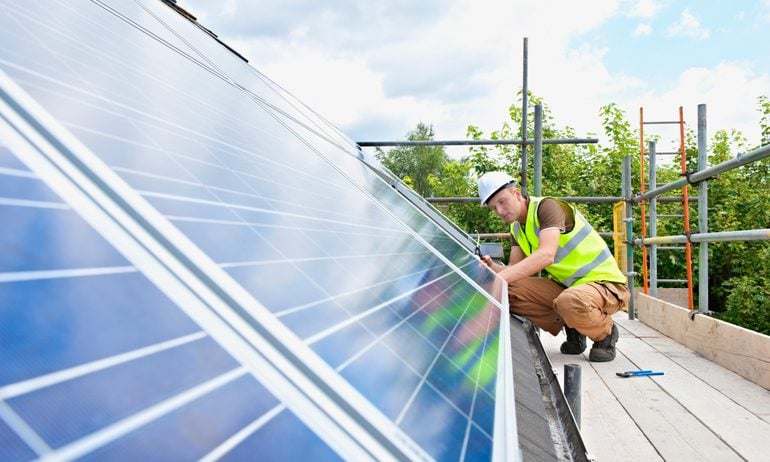What to Know About Solar Panel Financing

Many, or all, of the products featured on this page are from our advertising partners who compensate us when you take certain actions on our website or click to take an action on their website. However, this does not influence our evaluations. Our opinions are our own. Here is a list of our partners and here's how we make money.
How much do solar panels cost?
2024 solar panel costs by state
Solar panel system cost by state
| State | Average solar system cost after incentives | Average cost per watt |
|---|---|---|
| Alabama | $30,427. | $3.12. |
| Arizona | $18,799. | $2.07. |
| Arkansas | $23,164. | $2.50. |
| California | $14,476. | $2.30. |
| Colorado | $20,321. | $2.82. |
| Connecticut | $21,781. | $2.77. |
| Delaware | $21,347. | $2.41. |
| Florida | $21,092. | $2.11. |
| Georgia | $22,787. | $2.57. |
| Hawaii | $20,138. | $3.39. |
| Idaho | $22,334. | $2.53. |
| Illinois | $24,666. | $2.99. |
| Indiana | $27,504. | $3.18. |
| Iowa | $27,927. | $3.16. |
| Kansas | $25,732. | $3.08. |
| Kentucky | $27,372. | $2.72. |
| Louisiana | $20,813. | $2.44. |
| Maine | $24,385. | $3.02. |
| Maryland | $25,665. | $2.69. |
| Massachusetts | $23,107. | $3.19. |
| Michigan | $22,476. | $3.12. |
| Minnesota | $25,038. | $2.94. |
| Mississippi | $22,261. | $2.79. |
| Missouri | $25,265. | $2.82. |
| Montana | $22,787. | $2.61. |
| Nebraska | $21,266. | $2.24. |
| New Hampshire | $22,468. | $3.16. |
| New Jersey | $22,728. | $2.56. |
| New Mexico | $18,594. | $2.86. |
| Nevada | $18,939. | $2.17. |
| New York | $23,279. | $2.83. |
| North Carolina | $21,298. | $2.30. |
| Ohio | $23,024. | $2.58. |
| Oklahoma | $23,245. | $2.33. |
| Oregon | $20,992. | $2.64. |
| Pennsylvania | $23,422. | $2.71. |
| Rhode Island | $22,135. | $3.26. |
| South Carolina | $22,495. | $2.52. |
| Tennessee | $27,325. | $3.34. |
| Texas | $20,308. | $2.06. |
| Utah | $21,020. | $2.61. |
| Vermont | $21,460. | $2.89. |
| Virginia | $26,126. | $2.85. |
| Washington | $22,646. | $2.58. |
| Washington, D.C. | $19,921. | $2.90. |
| West Virginia | $31,636. | $3.10. |
| Wisconsin | $24,133. | $3.00. |
| Wyoming | $27,919. | $3.54. |
| Source: EnergySage, a solar and home energy product comparison marketplace. Data is from February 28, 2025. | #colspan | #colspan |
How to finance solar panels
Personal loan
Pros of personal loans
- Short repayment terms: Your net savings on a solar system will show up sooner because personal loans have shorter repayment terms than home equity and contractor financing.
- Fast funding: Approval can take one business day, and most personal loans can be funded within a few days after that, meaning you could have funds within a week of applying.
- No collateral: When a loan has collateral, like a house or a car, failure to repay can result in the lender taking possession. With an unsecured personal loan, there’s no risk of losing your home, though your credit score will take a hit if you miss payments.
Cons of personal loans
- High rates: Personal loans have high rates compared with home equity financing and government loans. The lowest rates go to borrowers with good to excellent credit (690 or higher), high incomes and low debt.
- No tax benefits: These loans don’t have the tax benefits you’d get with a home equity loan or line of credit. There are other tax incentives for adding solar panels (more on those below) but nothing extra for using a personal loan.
- May charge an origination fee: Some lenders charge an origination fee, which is usually 1% to 10% of the loan amount and deducted from the loan proceeds. For example, if your $20,000 loan has a 6% origination fee, you’ll receive $18,800.
When a personal solar loan is best
- Don’t want to use your home as collateral for the loan.
- Need to finance the panels, but don’t want to carry debt for a long time.
- Want the panels installed soon.
- Qualify for a low APR.
Home equity financing
Pros of home equity financing
- Low rates: A home equity loan is a second fixed-rate mortgage, while a HELOC usually has a variable interest rate. In both cases, the average rate is lower than most personal loans.
- Tax benefits: Whenever you use home equity financing for a home improvement project, including solar panel installation, you can deduct the interest on your taxes.
Cons of home equity financing
- Extended repayment terms: If you use home equity financing, you could be paying off the solar panels for well over a decade, which may offset the savings on your utility bills.
- Your home is collateral: If you’re unable to repay a home equity loan or line of credit, the lender could take your home, and your credit score will drop.
When a home equity loan or line of credit is best
- Don’t mind using your home as collateral.
- Want a low-rate financing option with tax-deductible interest.
- Are willing to pay for the solar panels for a decade or longer.
HELOC & Home Equity Loans from our partners

on Figure

640
$400,000

on New American Funding

580
$750,000

on Upstart Mortgage LLC

600
$250,000
FHA 203(k) loan
Pros of FHA 203(k) loans
- Soft borrowing requirements: FHA loans allow credit scores as low as 500, lower than many other mortgage lenders. However, a lower credit score may require a larger down payment.
- Low interest rates: Interest rates are lower on FHA 203(k) than personal loans.
Cons of FHA 203(k) loans
- FHA mortgage insurance: These loans require FHA mortgage insurance, regardless of the down payment amount.
- You must find a contractor who can start within 30 days: The FHA pays the contractor for their work from an escrow account and requires work to begin within 30 days of the first payment (usually the closing date) and finish within six months.
When a 203(k) loan is best
- Can’t qualify for a home equity loan or line of credit.
- Are refinancing and can get a similar or lower interest rate than your current mortgage.
- Can coordinate with the contractor to start and complete the project on time.
Contractor financing
Pros of contractor financing
- Convenience: Installing solar panels with a contractor that offers financing may be convenient because you can apply, be approved and get work started with the same company.
- Low rates: A solar company may offer lower rates than a home equity loan or line of credit.
Cons of contractor financing
- Extended repayment terms: Interest will add up — even if it’s a low rate — if the term is 20 or 25 years. Plus, the monthly payment will offset your savings for two decades.
- May charge an origination fee: Some lenders charge an origination or dealer fee, which you may not have to pay with home equity and government financing.
- May not offer pre-qualification: The contractor may not offer pre-qualification, which means you’ll undergo a hard credit check to see if you qualify for a loan.
When solar company financing is best
- Want the financing and installation through the same company.
- Would pay less than with a personal loan or home equity option.
How much can you save with solar panels?
- Will your electric bill decrease? Review your last few utility bills to see what you pay on average. Then, estimate your savings using a solar savings calculator, like Google’s Project Sunroof savings estimator.
- How long will it take to see savings? You won’t yield savings immediately after installing solar panels. The average payback period is about 10 years, according to SolarReviews, a website that reviews solar companies.
- Are you going to sell your home? Depending on the type of financing, installing solar panels can take years to pay off. If this isn’t your long-term home, consider whether managing the panels would be a turnoff for a potential buyer and whether you’d pay them off before moving.
- Do you expect frequent maintenance? Solar panels require at least annual cleaning to remove debris. According to EnergySage, annual cleanings cost between $15 and $30 per solar panel, depending on the system’s size, location of the home, and how often the panels are cleaned. You may also need an annual inspection, which can start at $150.
Solar tax benefits
- The system must be installed between Jan. 1, 2017, and Dec. 31, 2034.
- The system must be on your primary or secondary residence.
- You must have bought the solar panels. You’re still eligible if you financed the system, but residents with solar leases or power purchase agreements are not.
- The system must be new.
Local solar rebates
Solar leases and power purchase agreements
Do solar panels increase your home value?
Article sources
- 1. National Credit Union Administration. Payday Alternative Loans Final Rule. Accessed Apr 17, 2025.
- 2. National Bureau of Economic Research. Prodigals and Projecture: An Economic History of Usury Laws in the United States from Colonial Times to 1900. Accessed May 2, 2025.
- 3. Federal Register. Federal Interest Rate Authority: A Rule by the Federal Deposit Insurance Corporation on 07/22/2020. Accessed May 2, 2025.
- 4. Federal Reserve Bank of St. Louis. Finance Rate on Personal Loans at Commercial Banks, 24 Month Loan. Accessed May 23, 2025.
- 5. Consumer Financial Protection Bureau. What Is a Debt Relief Program and How Do I Know if I Should Use One?. Accessed Jan 16, 2025.
- 6. Consumer Financial Protection Bureau. Truth in Lending Act (TILA) examination procedures. Accessed May 2, 2025.
- 7. Experian and Oliver Wyman. Financial Inclusion and Access to Credit. Accessed Jan 23, 2025.
- 8. Internal Revenue Service. Canceled debt – Is it taxable or not?. Accessed Apr 1, 2025.
- 9. Consumer Financial Protection Bureau. What is a payday loan?. Accessed Apr 17, 2025.
- 10. Center for Responsible Lending. Payday and Other Small Dollar Loans. Accessed May 2, 2025.
- 11. National Credit Union Administration. Credit Union and Bank Rates 2024 Q4. Accessed May 23, 2025.
- 12. Federal Reserve. Military Lending Act. Accessed May 2, 2025.
- 13. Consumer Financial Protection Bureau. Consumer Use of Buy Now, Pay Later and Other Unsecured Debt. Accessed Jan 24, 2025.
- 14. Center for Responsible Lending. Unsafe Harbor: The Persistent Harms of High-Cost Installment Loans. Accessed May 2, 2025.
- 9. Consumer Financial Protection Bureau. What is a payday loan?. Accessed May 2, 2025.
- 16. Consumer Financial Protection Bureau. What are the costs and fees for a payday loan?. Accessed Jun 6, 2025.
- 17. Internal Revenue Service. Home energy tax credits. Accessed Mar 6, 2024.
- 18. Center for Responsible Lending. Unsafe Harbor: The Persistent Harms of High-Cost Lending. Accessed Jun 6, 2025.
- 19. Solar Energy Industries Association. Solar Power Purchase Agreements. Accessed Mar 7, 2024.
- 13. Consumer Financial Protection Bureau. Consumer Use of Buy Now, Pay Later and Other Unsecured Debt. Accessed Jan 27, 2025.
- 21. SolarReviews.com. Homes with Solar Sell for 6.8% More [2024 Zillow Data Study]. Accessed Dec 10, 2024.
- 22. Internal Revenue Service. Retirement Topics - Plan Loans. Accessed Apr 8, 2025.
- 9. Consumer Financial Protection Bureau. What is a payday loan?. Accessed Apr 4, 2025.
- 24. The Pew Charitable Trusts. Payday Loans Cost 4 Times More in States With Few Consumer Protections. Accessed Apr 4, 2025.
- 12. Federal Reserve. Military Lending Act. Accessed Apr 4, 2025.
- 26. Internal Revenue Service. Retirement topics: Exceptions to tax on early distributions. Accessed Apr 8, 2025.
- 27. Administrative Office of the U.S. Courts. Bankruptcy Basics. Accessed Apr 8, 2025.
HELOC & Home Equity Loans from our partners

on Figure

640
$400,000

on New American Funding

580
$750,000

on Upstart Mortgage LLC

600
$250,000
More like this



